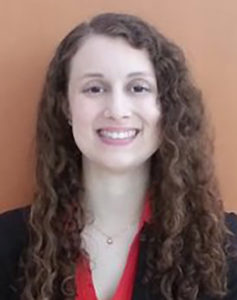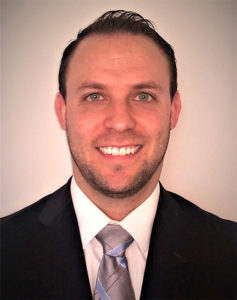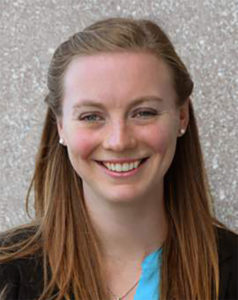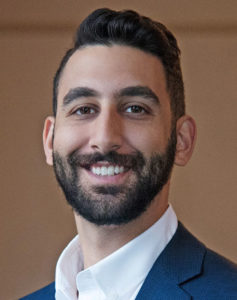
2017-2018 AIMBE Scholar Bios
Kathryn E. Drzewiecki, Ph.D.
 Dr. Drzewiecki is an AIMBE Scholar at the U.S. Food and Drug Administration in the Center for Devices and Radiological Health. She completed her Ph.D. in biomedical engineering and quantitative biomedicine at Rutgers University. Kathryn’s research and career has centered on the development of innovative technologies at the forefront of translational research. Her doctoral research focused on the design, characterization, and application of novel collagen-based materials as building blocks in tissue engineering, including her pioneering efforts in designing a new class of 3D printable, naturally derived collagen-based materials. During her tenure at Rutgers, she participated in countless workshops, including the Translational Research Workshop at Children’s Hospital of Philadelphia and the Quantitative Biomedicine Boot Camp at Rutgers University, to learn about the regulatory pathways and processes involved in the total product lifecycle of drugs and devices. Concurrently with and following her doctoral studies, Kathryn worked at one mid-sized company and two start-ups leading efforts to develop ground-breaking products for cancer immunotherapies, medical diagnostics, and tissue engineering. From her experience in academic and industrial research, Kathryn has seen firsthand how an understanding of regulatory science is crucial as we continue to rapidly develop new medical technologies and is excited to develop this expertise as an AIMBE Scholar. Kathryn’s goal is to specialize in regulatory science regarding disruptive and innovative medical technologies, like many of the products developed during her career, to foster innovation while promoting public health and safety.
Dr. Drzewiecki is an AIMBE Scholar at the U.S. Food and Drug Administration in the Center for Devices and Radiological Health. She completed her Ph.D. in biomedical engineering and quantitative biomedicine at Rutgers University. Kathryn’s research and career has centered on the development of innovative technologies at the forefront of translational research. Her doctoral research focused on the design, characterization, and application of novel collagen-based materials as building blocks in tissue engineering, including her pioneering efforts in designing a new class of 3D printable, naturally derived collagen-based materials. During her tenure at Rutgers, she participated in countless workshops, including the Translational Research Workshop at Children’s Hospital of Philadelphia and the Quantitative Biomedicine Boot Camp at Rutgers University, to learn about the regulatory pathways and processes involved in the total product lifecycle of drugs and devices. Concurrently with and following her doctoral studies, Kathryn worked at one mid-sized company and two start-ups leading efforts to develop ground-breaking products for cancer immunotherapies, medical diagnostics, and tissue engineering. From her experience in academic and industrial research, Kathryn has seen firsthand how an understanding of regulatory science is crucial as we continue to rapidly develop new medical technologies and is excited to develop this expertise as an AIMBE Scholar. Kathryn’s goal is to specialize in regulatory science regarding disruptive and innovative medical technologies, like many of the products developed during her career, to foster innovation while promoting public health and safety.
Matthew M. Jacobsen, Ph.D.
 Dr. Jacobsen is an AIMBE Scholar at the U.S. Food and Drug Administration in the Center for Devices and Radiological Health. Matthew has been interested in science policy and regulation ever since his early undergraduate career where he was exposed to impassioned stories from scientists and engineers attempting to navigate the world of regulation and compliance with great difficulty. This interest led him to pursue dual undergraduate degrees at the University of Utah in both Biomedical Engineering and Political Science. He then pursued and completed a Ph.D. in Biomedical Engineering at Boston University where he studied how to generate protein fibers of all kinds by mimicking the manner in which spiders spin silk in the laboratory. He stayed active in political pursuits during this time through his work with the Northeastern Section of the American Chemical Society as a Policy Liaison of the local section Government Affairs Committee. As an AIMBE scholar, he now hopes to further this knowledge base while providing the perspective of the scientist when considering new regulation for modern medical devices. Matthew intends to build on this new experience to lead a career focused on improving the overall interactions between the medical device industry and the regulatory bodies governing it.
Dr. Jacobsen is an AIMBE Scholar at the U.S. Food and Drug Administration in the Center for Devices and Radiological Health. Matthew has been interested in science policy and regulation ever since his early undergraduate career where he was exposed to impassioned stories from scientists and engineers attempting to navigate the world of regulation and compliance with great difficulty. This interest led him to pursue dual undergraduate degrees at the University of Utah in both Biomedical Engineering and Political Science. He then pursued and completed a Ph.D. in Biomedical Engineering at Boston University where he studied how to generate protein fibers of all kinds by mimicking the manner in which spiders spin silk in the laboratory. He stayed active in political pursuits during this time through his work with the Northeastern Section of the American Chemical Society as a Policy Liaison of the local section Government Affairs Committee. As an AIMBE scholar, he now hopes to further this knowledge base while providing the perspective of the scientist when considering new regulation for modern medical devices. Matthew intends to build on this new experience to lead a career focused on improving the overall interactions between the medical device industry and the regulatory bodies governing it.
Mary Clare McCorry, Ph.D.
 Dr. McCorry is an AIMBE Scholar at the U.S. Food and Drug Administration in the Center for Devices and Radiological Health. She obtained her Ph.D. in Biomedical Engineering from Cornell University. Mary Clare’s doctoral research targeted pre-clinical challenges for the translation of a tissue engineered meniscus. Much of her work focused on stem cell applications and methods to influence stem cell behavior in the context of tissue engineering. Mary Clare was awarded two clinical translational training fellowships in order to support cross-disciplinary collaborations with veterinary and medical orthopaedic surgeons. This collaboration helped to inform engineering design of meniscal implants as well as provide relevant clinical training to the project. During her doctoral research, Mary Clare collaborated with GE Global Research on the development of an automated tissue loading bioreactor. The goal of the bioreactor project was to develop a culture method that was translatable to the future scale up of tissue engineered products and would enable appropriate quality control throughout tissue culture. As an AIMBE fellow, Mary Clare plans to apply her experiences in biomedical engineering to help develop new regulatory policies for emerging technologies. Mary Clare’s long term goal is to utilize her technical and regulatory background to develop medical technologies that will improve human health and treatment options.
Dr. McCorry is an AIMBE Scholar at the U.S. Food and Drug Administration in the Center for Devices and Radiological Health. She obtained her Ph.D. in Biomedical Engineering from Cornell University. Mary Clare’s doctoral research targeted pre-clinical challenges for the translation of a tissue engineered meniscus. Much of her work focused on stem cell applications and methods to influence stem cell behavior in the context of tissue engineering. Mary Clare was awarded two clinical translational training fellowships in order to support cross-disciplinary collaborations with veterinary and medical orthopaedic surgeons. This collaboration helped to inform engineering design of meniscal implants as well as provide relevant clinical training to the project. During her doctoral research, Mary Clare collaborated with GE Global Research on the development of an automated tissue loading bioreactor. The goal of the bioreactor project was to develop a culture method that was translatable to the future scale up of tissue engineered products and would enable appropriate quality control throughout tissue culture. As an AIMBE fellow, Mary Clare plans to apply her experiences in biomedical engineering to help develop new regulatory policies for emerging technologies. Mary Clare’s long term goal is to utilize her technical and regulatory background to develop medical technologies that will improve human health and treatment options.
Joseph Shawky, Ph.D.
 Joseph is an AIMBE Scholar at the U.S. Food and Drug Administration in the Center for Devices and Radiological Health, Office of Compliance. Joseph earned his Ph.D. in Bioengineering at the University of Pittsburgh. His doctoral research focused on understanding the physical basis of birth defect progression and tissue self-assembly. Specifically, he studied how mechanics of embryonic tissues is regulated at the molecular, cell and tissue level.
Joseph is an AIMBE Scholar at the U.S. Food and Drug Administration in the Center for Devices and Radiological Health, Office of Compliance. Joseph earned his Ph.D. in Bioengineering at the University of Pittsburgh. His doctoral research focused on understanding the physical basis of birth defect progression and tissue self-assembly. Specifically, he studied how mechanics of embryonic tissues is regulated at the molecular, cell and tissue level.
Beyond the laboratory, Joseph worked as a Jr. Commercial Translation Associate with sciVelo, a group within the University of Pittsburgh focused on driving promising life-science technologies to commercialization. In this capacity, Joseph developed and managed critical pathways for university investigators and gained experience in innovation and business development.
Joseph was also a Project Manager with Fourth River Solutions, a non-profit, student-led consultancy in Pittsburgh and led teams of doctoral and post-doctoral students on strategy development, market assessment and competitive analysis for non-university clients. Additionally, he has been heavily involved in the creation and execution of programs to mentor bioengineering graduate students. He co-founded the Peer Networking and Professional Development Program and co-chaired Bioengineering day, an event to showcase biomedical research in Pittsburgh and foster relationships between students, faculty and biotech industry.
As an AIMBE Scholar, Joseph is excited to bring his background in bioengineering and commercial translation to create efficient policy that fuels innovation while protecting public health. Ultimately, Joseph seeks to leverage his background in commercialization and biomedical science to propel safe and effective healthcare technologies to market.
 AIMBE
AIMBE
